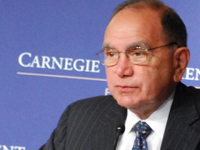Registration
You will receive an email confirming your registration.
The possibility of repeated Ukrainian-Russian gas cutoffs as well as persistent discussions of a new great game in Central Asia illustrate the need for a serious examination of Russia and the Caspian’s role in the global energy balance and a re-thinking of U.S. policy toward the region.
To facilitate this discussion, Ambassador Edward P. Djerejian and Amy Myers Jaffe from the James A. Baker III Institute for Public Policy joined Carnegie Martha Brill Olcott to present the Baker Institute’s new study, Russia and the Caspian States in the Global Energy Balance. Deputy Assistant Secretary of State George Krol served as commentator, while Jessica T. Mathews moderated.
A Russian Cartel?
Russia turned heads when it announced plans to form an organization with Iran and Qatar—together, the three nations control 60 percent of the world’s gas reserves—that many analysts fear wcould result in a gas cartel. However, as Jaffe explained, in recent years the energy supply system has changed and today there are far too many energy suppliers to enable Russia to effectively create and control a gas cartel.
Jaffe concluded that even if Iran and Qatar cooperated with Russia, they would only enjoy minimal short-term price gains while losing significant market share over time by allowing Iraq the opportunity to win a significant piece of the European gas market.
Saudi Influence
The policies of Saudi Arabia have significant implications for Eurasian energy and political concerns. Jaffe noted that the Saudis are not interested in making Russia a competitor for influence in the Middle East. They have indicated in the past, however, that Russia's unwillingness to help diplomatically solve the Iranian nuclear issue may prompt them to drop the price of oil as a way to hurt Russia financially and influence the geopolitical backdrop to the ongoing nuclear question.
U.S. Policy Toward Eurasia
Ambassador Djerejian emphasized that the United States can no longer overlook energy in its relationship with Russia. Yet he warned that diplomatic activity in the Caspian region and Caucasus should go beyond pipeline diplomacy. The United States, in cooperation with the European Union, needs to take a more proactive diplomatic role in the region to help resolve existing territorial conflicts.
Deputy Assistant Secretary Krol agreed with Ambassador Djerejian that the United States should not view Caspian energy policy independently from other issues. He stressed, however, that the United States currently supports a regional outlook and would like to encourage dialogue between the nations of the region.
